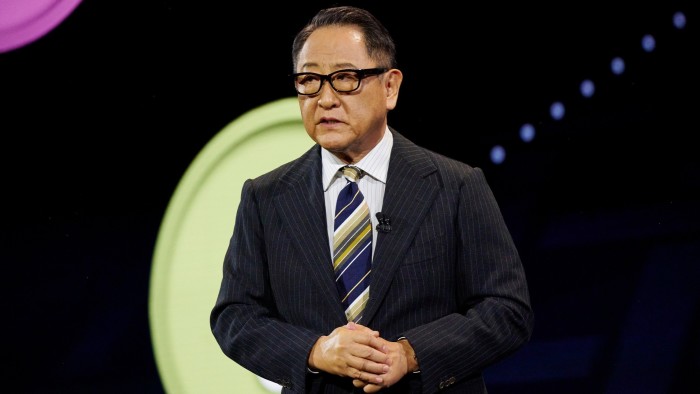Unlock the Editor’s Digest for free
Roula Khalaf, Editor of the FT, selects her favourite stories in this weekly newsletter.
In late June, Hiromi Yamaji, the president of the company that controls the Tokyo Stock Exchange, will begin a tour of global institutional investors. It should have been a light-footed victory lap; it will instead be more of a muddy trudge.
Until last week, Yamaji had a nuanced — but fundamentally positive — story to tell the outside world about rising governance standards, fairer treatment of shareholders, reduction of cross shareholdings, record numbers of shareholder proposals at annual meetings and the arrival, at long, long last, of the great consolidation of corporate Japan. Investment funds that spent years dreaming of this moment have greyed and withered in the wait, but it was worth it.
Or should have been. The narrative has suddenly been hijacked by a $33bn take-private deal for the forklift truckmaker Toyota Industries (TICO). The country’s biggest ever take-private has angered some minority shareholders. Not because it is happening — it is theoretically part of the desirable streamlining of corporate Japan. The issue is more about how the transaction is being conducted with bad-old-days complaints of alleged minority shareholder abuse, opaque valuations and apparent conflict of interest., One veteran asset manager and TICO shareholder has expressed a “deep sense of despair”.
The proposed deal is led by Toyota Fudosan, the private real estate company which is part of broader group around the world’s biggest carmaker Toyota Motor, which is in turn partly funding the transaction. Akio Toyoda, who is personally investing, is chair of both Fudosan and TMC — a fact that, in the eyes of investors creates overlapping fiduciary obligations; TICO is already 42.3 per cent owned by a combination of Toyota Motor and companies linked to the carmaker.
Like investors in other listed subsidiaries of big Japanese conglomerates that hope for buyouts of the companies by parents, some TICO shareholders have long bet on (and hustled for) some corporate rationalisation. But while the deal appears excellent for TMC and for Toyoda himself as an investor in the transaction, it looks horrible for minority shareholders of the forklift truckmaker, and raises questions over how much TICO’s board pushed for a higher price or felt able to do so.
While the price might be raised, the current ¥16,300 per share offer puts only a 23 per cent premium on the pre-announcement share price, while some investors believe a proper valuation would demand a price of above ¥20,000. They denounce the TICO board as remiss, or cowed, for not securing this. Critically, argue investors, the company has not been transparent enough on how, or whether, it has appraised the potential unrealised gains in its real estate holdings. The property of many older Japanese companies often appears on the books at the price of transactions from decades earlier.
This phenomenon was illustrated beautifully in 2023 when lossmaking Toyota subsidiary Hino Motors sold for $334mn a piece of land that had long appeared on its books valued at $670,000. There must be similar gems lurking in the TICO portfolio, argue some investors.
Three hypotheticals define where this deal puts Japan. The first is: what if this exact deal had happened 10 years ago, just before Japan got its first governance code? Everyone would probably have shrugged, muttered “this is Japan”, and let it happen. The optimistic narrative of Japan in 2025 has been that its shrugging days are in the past. Regulators, investors and companies themselves should now prove they are.
The second is what if a deep-pocketed private real estate fund, say Blackstone, had bid for TICO? TICO’s board would probably argue that its undervalued property portfolio was the target, and would no doubt produce a realistic valuation in order to prove Blackstone was underbidding. It needs to more fully explain why it has not done so in this instance.
The third hypothetical is which companies other than those associated with the convoluted, all-powerful Toyota group, could attempt a deal with so much opposition from minority shareholders? A pessimist will conclude that there are many out there who will now feel emboldened to do similar. Advocates for the Japan progress story must find a way to show that this deal is an outlier.
Every sensible investor knew that when Japan’s great consolidation arrived, it was always going to be very, very messy: decades of often dismal governance standards, docile domestic institutions and generations of C-suite executives who were never held to account for downplaying minority shareholder interest were never going to magically produce a fair, efficient market for corporate control overnight. That explains; it doesn’t excuse.
